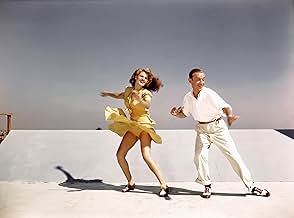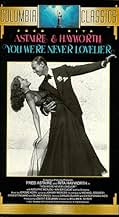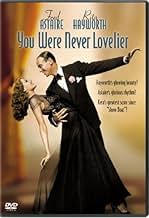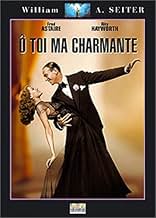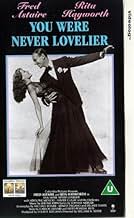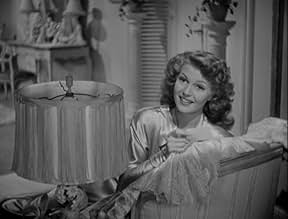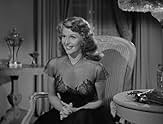AVALIAÇÃO DA IMDb
7,1/10
4,4 mil
SUA AVALIAÇÃO
Em Buenos Aires, um homem que decretou que suas filhas devem se casar por ordem de idade permite que um dançarino americano se apresente em seu clube na condição de que ele atue como pretend... Ler tudoEm Buenos Aires, um homem que decretou que suas filhas devem se casar por ordem de idade permite que um dançarino americano se apresente em seu clube na condição de que ele atue como pretendente de sua segunda filha.Em Buenos Aires, um homem que decretou que suas filhas devem se casar por ordem de idade permite que um dançarino americano se apresente em seu clube na condição de que ele atue como pretendente de sua segunda filha.
- Direção
- Roteiristas
- Artistas
- Indicado a 3 Oscars
- 3 indicações no total
Kirk Alyn
- Julia's Groom
- (não creditado)
Desi Arnaz
- Band Singer
- (não creditado)
Larry Arnold
- Wedding Guest
- (não creditado)
William A. Boardway
- Wedding Guest
- (não creditado)
Stanley Brown
- Roddy - Cecy's Boyfriend
- (não creditado)
George Bunny
- Flower Man
- (não creditado)
James Carlisle
- Wedding Guest
- (não creditado)
Jack Chefe
- Nightclub Patron
- (não creditado)
Avaliações em destaque
...and Fred Astaire was never as boyishly charming as he is here. This is a lovely, escapist, feel-good musical made in the early 40's to appease WW2-weary audiences. This is Rita and Fred's second (and final) outing after the surprise success of 'You'll Never Get Rich', and, while the first film was very enjoyable, this is an improvement on it's predecessor.
Hayworth shines as the girl who's not very interested in marriage until a 'secret admirer' and Fred Astaire come into the picture. She's very beautiful and glamorous in the role; the 'Cansino-to-Hayworth' transformation was going along nicely at the film's time of release. Astaire is always very appealing, and he does light comedy quite well. This hs a far sharper script than 'You'll Never Get Rich' and benefits from the non-wartime backdrop. Yes, the war was going on when Rita and Fred were making dancing magic, but you'd never know it from the happy little self-contained vacuum that Columbia creates for the pair in a story meant to be set in exotic South America.
I guess Rita, with her Latin roots, was the perfect choice for Maria, and she manages to outdo the master Astaire in the Latino-inspired dance routines. Her singing is dubbed, but Rita's dancing is sublime and her acting is very effective.
This film also has more memorable songs than the 1941 Astaire-Hayworth outing (I don't particularly like to compare, but it's hard not to), with 'You Were Never Lovelier', 'Shorty George' and 'I'm Old Fashioned' being great tunes. 'Shorty George' entranced me so much that I re-played the sequence on DVD three times before I moved forward in the film!
It doesn't have much of a plot, but we know that Astaire's musicals were always light on this factor so we can be forgiving. What it does have is a perfect, innocent sweetness that cannot possibly be recaptured today. From early scenes with Astaire trying to make conservation with a haughty Rita, to the final scene where the awkward yet lovable Fred arrives as Rita's 'knight in shining armor' on a white horse, 'You Were Never Lovelier' is just...well, lovely.
8/10.
Hayworth shines as the girl who's not very interested in marriage until a 'secret admirer' and Fred Astaire come into the picture. She's very beautiful and glamorous in the role; the 'Cansino-to-Hayworth' transformation was going along nicely at the film's time of release. Astaire is always very appealing, and he does light comedy quite well. This hs a far sharper script than 'You'll Never Get Rich' and benefits from the non-wartime backdrop. Yes, the war was going on when Rita and Fred were making dancing magic, but you'd never know it from the happy little self-contained vacuum that Columbia creates for the pair in a story meant to be set in exotic South America.
I guess Rita, with her Latin roots, was the perfect choice for Maria, and she manages to outdo the master Astaire in the Latino-inspired dance routines. Her singing is dubbed, but Rita's dancing is sublime and her acting is very effective.
This film also has more memorable songs than the 1941 Astaire-Hayworth outing (I don't particularly like to compare, but it's hard not to), with 'You Were Never Lovelier', 'Shorty George' and 'I'm Old Fashioned' being great tunes. 'Shorty George' entranced me so much that I re-played the sequence on DVD three times before I moved forward in the film!
It doesn't have much of a plot, but we know that Astaire's musicals were always light on this factor so we can be forgiving. What it does have is a perfect, innocent sweetness that cannot possibly be recaptured today. From early scenes with Astaire trying to make conservation with a haughty Rita, to the final scene where the awkward yet lovable Fred arrives as Rita's 'knight in shining armor' on a white horse, 'You Were Never Lovelier' is just...well, lovely.
8/10.
she is - this time in "You Were Never Lovelier," a 1942 film starring Fred Astaire, Adolphe Menjou, and Xavier Cugat along with Hayworth. Menjou plays Eduardo Acuna, the father of four daughters in Argentina, and according to tradition, the girls must marry in order. Second to be married is Maria (Hayworth). Unfortunately, in this case, the two younger daughters have suitors and Maria has no interest in marriage or in any of the dozens of men who have tried to win her heart. Her father hatches a plan to send her orchids and letters from a secret admirer. Then he plans for the secret admirer to disappear, hoping that she'll then turn to an ordinary man. When he has a dancer, Bob Davis (Astaire) who is trying to get a job in the club deliver the orchids, Maria thinks that Davis is her secret admirer. The two wind up falling in love, which doesn't fit in with Dad's plans.
Hayworth's first entrance in this is as she gives her sister something for her wedding. She's so gorgeous it's ridiculous. It's said that during the making of Blood & Sand, Tyrone Power was so enamored of Hayworth that he couldn't stop staring at her (and in fact, she's one of the few women who could match him looks-wise). Not surprising. What's wonderful about this film is that Hayworth wears fabulous gowns and dances with Fred Astaire. They make a terrific pair, and Astaire loved working with her. When they dance to "I'm Old Fashioned," it's as if they're floating on a cloud. She seems to bring out a sweet side to Astaire's acting, and the character he plays is less sure of himself than the Astaire roles usually are. And of course, he dances like a dream, with a wonderful audition solo for Menjou.
For this writer, there were many beautiful women in Hollywood. But two were the complete movie star package with superior beauty, personality, and raw sex appeal - Rita Hayworth and Ava Gardner. Rita, with her wonderful dance talent, probably has a slight edge. It's tragic that her personal life was so sad and that she herself was such a troubled woman. It just doesn't seem fair to be that sensational and that miserable at the same time.
This is a lovely, romantic film produced specifically for the World War II audience - while we're not going through World War II today, most of us are depressed enough that we could be, so it's still a great watch.
Hayworth's first entrance in this is as she gives her sister something for her wedding. She's so gorgeous it's ridiculous. It's said that during the making of Blood & Sand, Tyrone Power was so enamored of Hayworth that he couldn't stop staring at her (and in fact, she's one of the few women who could match him looks-wise). Not surprising. What's wonderful about this film is that Hayworth wears fabulous gowns and dances with Fred Astaire. They make a terrific pair, and Astaire loved working with her. When they dance to "I'm Old Fashioned," it's as if they're floating on a cloud. She seems to bring out a sweet side to Astaire's acting, and the character he plays is less sure of himself than the Astaire roles usually are. And of course, he dances like a dream, with a wonderful audition solo for Menjou.
For this writer, there were many beautiful women in Hollywood. But two were the complete movie star package with superior beauty, personality, and raw sex appeal - Rita Hayworth and Ava Gardner. Rita, with her wonderful dance talent, probably has a slight edge. It's tragic that her personal life was so sad and that she herself was such a troubled woman. It just doesn't seem fair to be that sensational and that miserable at the same time.
This is a lovely, romantic film produced specifically for the World War II audience - while we're not going through World War II today, most of us are depressed enough that we could be, so it's still a great watch.
Fred Astaire's films are all pretty much the same: quaint romantic hijinks driving a ridiculous but entertaining screwball plot. By the 1940s, he and Ginger Rogers had parted ways (at least until 'The Barkleys of Broadway (1949)'), and the studios were left to find him a suitable new partner. RKO's first experiment, opposite Joan Fontaine in 'A Damsel in Distress (1937),' had been far less than successful, as much as I love Joan Fontaine. Astaire's best prospects came from a lovely young lady named Rita Hayworth, with whom he starred in 'You'll Never Get Rich (1941)' and 'You Were Never Lovelier (1942).' Ah, Rita Hayworth! (Forgive me while I regain my train of thought). This comedy musical, directed by William A. Seiter, features the same unlikely romantic mix-ups you'd expect to find in a Fred and Ginger movie of the 1930s. In fact, the director had previously made 'Roberta (1935),' and he improves upon that film.
Eduardo Acuña (Adolphe Menjou) is a man very much used to getting his own way. Determined that his second daughter Maria (Hayworth) should fall in love, he begins writing her anonymous love letters, only for her to mistake American dancer Bob Davis (Astaire) for her nameless romantic suitor. Bob reluctantly agrees to carry on the deception, but soon falls for Maria himself. It doesn't take a genius to guess where this is going, but, like Astaire's previous films, it is well worth watching for the marvellous chemistry of the two leads. Put simply, Hayworth is endlessly, stunningly, ravishingly gorgeous. Though Ginger Rogers' exquisite comedic timing is noticeably absent (leaving Fred to take up the comedic slack), every scene with Hayworth is spent in breathtaking company. And she's not just a pretty face: the young actress is a very talented dancer, keeping up with Astaire step-for-step.
Eduardo Acuña (Adolphe Menjou) is a man very much used to getting his own way. Determined that his second daughter Maria (Hayworth) should fall in love, he begins writing her anonymous love letters, only for her to mistake American dancer Bob Davis (Astaire) for her nameless romantic suitor. Bob reluctantly agrees to carry on the deception, but soon falls for Maria himself. It doesn't take a genius to guess where this is going, but, like Astaire's previous films, it is well worth watching for the marvellous chemistry of the two leads. Put simply, Hayworth is endlessly, stunningly, ravishingly gorgeous. Though Ginger Rogers' exquisite comedic timing is noticeably absent (leaving Fred to take up the comedic slack), every scene with Hayworth is spent in breathtaking company. And she's not just a pretty face: the young actress is a very talented dancer, keeping up with Astaire step-for-step.
Okay, it's not Tosca. But holy smoke, what an efflorescence of talented song writers and lyricists the American stage produced in the thirty years between 1925 and 1955! Irving Berlin, George and Ira Gershwin, Yip Harburg, Johnny Mercer, Jerome Kern, Cole Porter, the list goes on. And the songs! From Astaire's films alone, we have Orchids in the Moonlight, The Carioca, Let's Face the Music and Dance, Yesterdays, Smoke Gets in Your Eyes, Cheek to Cheek, The Way You Look Tonight, A Fine Romance, They All Laughed, Let's Call the Whole Thing off ("You say tomato, I say tomahto..."), They Can't Take That Away From Me. That's a handful of the more familiar numbers from the first films Astaire made with Ginger Rogers.
"You Were Never Lovelier" has melodies by Jerome Kern and lyrics by Johnny Mercer. Ginger isn't here, but Rita Hayworth is. Her beauty is undeniable. She'd undergone hair removal and Hollywood glamorization by this time and in a few years a pin-up pic of her was to be pasted onto a famous bomb. I missed Astaire's earlier movies. By the time I was old enough, Gene Kelly dominated the screen. I saw Astaire in his later films and didn't like him nearly as much as Kelly. Kelly's background was in athletics. He was masculine and muscular and working class. Astaire's background was in ballroom dancing. How can an adolescent identify with a skinny balding narrow-shouldered dancer in a tuxedo who doesn't swing from ropes? But there's no longer much doubt in most peoples' minds, including mine, that Astaire was by far the better dancer, Kelly's charm notwithstanding. Astaire was elegant and precise and his dance steps were varied; Kelly seemed to repeat his leg-over-leg jumps over and over in each number.
At any rate, the plot of "You Were Never Lovelier" is rather original for an Astaire musical. I don't think it goes farther back in history than Aristophanes. It's a complicated business involving mistaken identities, an interfering father, and whatnot. But it doesn't matter, because the numbers are what counts. Kern and Mercer provide two songs that have become standards: "Dearly Beloved" and "I'm Old Fashioned." Anyone who wants to see the Hollywood musical at its best would be advised to listen to either song and to watch the dancing during "I'm Old Fashioned." "Dearly Beloved" occurs throughout the film as a kind of theme, and is sung once by Astaire and once by Hayworth, but is never accompanied by a dance. There are other songs too, of course, although none enchants the way these two ballads do. One of the numbers is "The Shorty George." Astaire's movies often had references to a new popular dance craze -- The Carioca, The Yam, the Sluefoot -- and this is an instance of that tendency. It was named after a real dancer, George Snowden, a dancer at the Savoy Ballroom in Harlem, known as "Shorty." If "I'm Old Fashioned" has a swooping grace, "The Shorty George" includes sections set at a blistering tempo and demonstrates Rita Hayworth's energy and range as a dancer.
Speaking of energy, how do they do it? "I'm Old Fashioned", like most of Astaire's numbers, consists of very long takes in medium distance that depend on both precision and physical stamina. (If you want to see an example of the opposite, watch Travolta do his final number in "Staying Alive.") I counted three cuts during the entire dance, which lasts four minutes and thirty-seven seconds. I'd have a heart attack after the first thirty-seven seconds.
Well, okay. It's not Fred and Ginger. It's not even Tosca. But if you want to watch two people engaged in the unpretentious exercise of a physical skill acquired only with the utmost difficulty, this one shouldn't be missed.
"You Were Never Lovelier" has melodies by Jerome Kern and lyrics by Johnny Mercer. Ginger isn't here, but Rita Hayworth is. Her beauty is undeniable. She'd undergone hair removal and Hollywood glamorization by this time and in a few years a pin-up pic of her was to be pasted onto a famous bomb. I missed Astaire's earlier movies. By the time I was old enough, Gene Kelly dominated the screen. I saw Astaire in his later films and didn't like him nearly as much as Kelly. Kelly's background was in athletics. He was masculine and muscular and working class. Astaire's background was in ballroom dancing. How can an adolescent identify with a skinny balding narrow-shouldered dancer in a tuxedo who doesn't swing from ropes? But there's no longer much doubt in most peoples' minds, including mine, that Astaire was by far the better dancer, Kelly's charm notwithstanding. Astaire was elegant and precise and his dance steps were varied; Kelly seemed to repeat his leg-over-leg jumps over and over in each number.
At any rate, the plot of "You Were Never Lovelier" is rather original for an Astaire musical. I don't think it goes farther back in history than Aristophanes. It's a complicated business involving mistaken identities, an interfering father, and whatnot. But it doesn't matter, because the numbers are what counts. Kern and Mercer provide two songs that have become standards: "Dearly Beloved" and "I'm Old Fashioned." Anyone who wants to see the Hollywood musical at its best would be advised to listen to either song and to watch the dancing during "I'm Old Fashioned." "Dearly Beloved" occurs throughout the film as a kind of theme, and is sung once by Astaire and once by Hayworth, but is never accompanied by a dance. There are other songs too, of course, although none enchants the way these two ballads do. One of the numbers is "The Shorty George." Astaire's movies often had references to a new popular dance craze -- The Carioca, The Yam, the Sluefoot -- and this is an instance of that tendency. It was named after a real dancer, George Snowden, a dancer at the Savoy Ballroom in Harlem, known as "Shorty." If "I'm Old Fashioned" has a swooping grace, "The Shorty George" includes sections set at a blistering tempo and demonstrates Rita Hayworth's energy and range as a dancer.
Speaking of energy, how do they do it? "I'm Old Fashioned", like most of Astaire's numbers, consists of very long takes in medium distance that depend on both precision and physical stamina. (If you want to see an example of the opposite, watch Travolta do his final number in "Staying Alive.") I counted three cuts during the entire dance, which lasts four minutes and thirty-seven seconds. I'd have a heart attack after the first thirty-seven seconds.
Well, okay. It's not Fred and Ginger. It's not even Tosca. But if you want to watch two people engaged in the unpretentious exercise of a physical skill acquired only with the utmost difficulty, this one shouldn't be missed.
Set in Hollywood's fanciful concept of Buenos Aires during the early 1940's, "You Were Never Lovelier" is pure escapist fluff that has been filmed with class. Of course, Fred Astaire adds class to any film in which he appears, and the ravishing Rita Hayworth is eye candy with talent. Astaire always refused to say who was his favorite dancing partner, but, based on the rapport and coordination between the two, Hayworth must have been high on his list. She is a beautiful trained dancer, and the sight of Rita tossing her long red mane while gracefully keeping step with Astaire makes one wish that Astaire-Hayworth musicals had been as numerous as those with Astaire-Rogers.
The film's flimsy plot revolves around a wealthy Argentine patriarch's refusal to let his daughters marry out of age order, and Hayworth's disinterest in marriage is delaying the weddings of her two younger sisters. Adolphe Menjou, who plays the father of four daughters, dreams up a mystery suitor, and eventually Rita confuses Astaire with this imaginary beau. But, never mind the lack of Latin flavor or the transparent silliness of the script. The plot has no surprises, but enough Jerome Kern songs and elegant dance routines, either solo by Astaire or Astaire and Hayworth together, punctuate the proceedings to keep viewers entertained.
Of course, audiences have to suspend disbelief and accept that a love goddess like Rita would fall for a skinny, somewhat older, and ordinary looking Fred, when dozens of tall, dark, and handsome Latin men were panting for her attention. But, like the sound-stage Argentine sets, this is fantasy, and Fred always wins the gorgeous girl, be she Ginger Rogers, Audrey Hepburn, or Judy Garland. Of his dancing partners, only Gene Kelly got away. Women must be won over by Fred's moves, and what great moves they are. "You Were Never Lovelier" boasts some excellent dance routines, and Astaire's work with Hayworth ranks with his best. If the nonsensical plot fails to engage you, hold on, because the dancing will carry you away.
The film's flimsy plot revolves around a wealthy Argentine patriarch's refusal to let his daughters marry out of age order, and Hayworth's disinterest in marriage is delaying the weddings of her two younger sisters. Adolphe Menjou, who plays the father of four daughters, dreams up a mystery suitor, and eventually Rita confuses Astaire with this imaginary beau. But, never mind the lack of Latin flavor or the transparent silliness of the script. The plot has no surprises, but enough Jerome Kern songs and elegant dance routines, either solo by Astaire or Astaire and Hayworth together, punctuate the proceedings to keep viewers entertained.
Of course, audiences have to suspend disbelief and accept that a love goddess like Rita would fall for a skinny, somewhat older, and ordinary looking Fred, when dozens of tall, dark, and handsome Latin men were panting for her attention. But, like the sound-stage Argentine sets, this is fantasy, and Fred always wins the gorgeous girl, be she Ginger Rogers, Audrey Hepburn, or Judy Garland. Of his dancing partners, only Gene Kelly got away. Women must be won over by Fred's moves, and what great moves they are. "You Were Never Lovelier" boasts some excellent dance routines, and Astaire's work with Hayworth ranks with his best. If the nonsensical plot fails to engage you, hold on, because the dancing will carry you away.
Você sabia?
- CuriosidadesBecause all the sets on the Columbia lot were occupied, Fred Astaire and Rita Hayworth rehearsed most of their routines in the nearby Hollywood Cemetery funeral parlor. They had to stop rehearsing to the upbeat music whenever a funeral procession arrived.
- Erros de gravaçãoWhen Maria and Mrs. Castro meet Robert in the sky room, Maria holds her overcoat lapels with both hands. Between shots she appears with both her arms hanging.
- Citações
Mrs. Delfina Acuña: I wish you wouldn't speak while I'm interrupting.
- Cenas durante ou pós-créditosIn the opening credits, the two film stars and the movie title appear on the front and back of a flower gift card held in the hands of a glamorous woman. The rest of the credits follow as in normal film credits.
- ConexõesFeatured in O Rochedo de Gibraltar (1988)
- Trilhas sonorasYou Were Never Lovelier
(1942) (uncredited)
Music by Jerome Kern
Lyrics by Johnny Mercer
Played during the opening credits and often as background music
Played by Xavier Cugat and His Orchestra and sung by Fred Astaire
Danced by Fred Astaire and Rita Hayworth at the anniversary party
Danced by Fred Astaire and Rita Hayworth at the end and sung by an offscreen chorus
Principais escolhas
Faça login para avaliar e ver a lista de recomendações personalizadas
- How long is You Were Never Lovelier?Fornecido pela Alexa
Detalhes
Bilheteria
- Faturamento bruto nos EUA e Canadá
- US$ 672.900
- Tempo de duração
- 1 h 37 min(97 min)
- Cor
- Proporção
- 1.37 : 1
Contribua para esta página
Sugerir uma alteração ou adicionar conteúdo ausente


